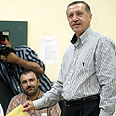
AKP reelection sparks concern
Landslide victory for Turkey's conservative, Islamic-based party has seculars worried about continuing separation of religion and state, and even possible Islamic takeover
ISTANBUL - Upon landing at the airport in Turkey, the signs of conflict between the secular and religious populations were already apparent.
The flight attendant points at a TV screen showing partial election results on a map of Turkey. The map was almost entirely orange, representing the AKP (Justice and Development Party) - a moderate, conservative party with Islamic roots, led by Recep Tayyip Erdogan.
"I voted for the CHP (the secular Republican People's Party). I'm very worried about the implications of a victory by Erdogan. Within a few years, women with head-coverings, who can be seen more and more, will grow in number," the flight attendant told me.
But, outside the airport, in a random survey in Istanbul, it seems that most respondents voted for Erdogan. Hotel workers, cab drivers and others were pleased by what, a few hours later, turned out to be a landslide reelection of the AKP.
Erdogan's party won 47 percent of the popular vote, and was projected to win 341 of the 550 parliament seats, down from 351 in the outgoing parliament (elected in 2002). He did not secure the two-thirds majority necessary to appoint a president, an issue which now will be decided by a parliamentary vote.
For now, the results don't seem too troubling for Israel, which has fostered good relations with Erdogan's government over the past four years. Jerusalem sources had actually been more worried about a sharp increase in votes for the right-wing MH party, which did not happen.
Religion vs. state
The most recent elections put the issue of religion vs. state at the forefront. Turkey, a republic since 1923, has a strict separation of religion and state with laws in place to protect the secular nature of the country.
Erdogan, a devout Muslim, was pushed to call for early elections to defuse tensions with the secular establishment, after he nominated Foreign Minister Abdullah Gul of AKP as a presidential candidate.
If an Islamist is appointed president, a position which holds substantial authority, it would be easier for an AKP government to pass Islamic laws. Opponents said apppointing Gul would remove the last obstacle to an Islamic takeover of government, and recent months saw many demonstrations by secular protestors in Turkey against the nomination.
In April, the BBC quoted the Turkish military's response to the nomination: "Turkish Armed Forces maintain their sound determination to carry out their duties stemming from laws to protect the unchangeable characteristics of the Republic of Turkey. Their loyalty to this determination is absolute."
The statement seemed to allude to a coup in 1997, in which the military forced AKP's predecessor, the Welfare Party, out of power. As a result of such statements, Gul abandoned his presidential bid in May.
Sources inside Turkey do not believe a military takeover is imminent in 2007, stating that the armed forces will most likely wait to see who Erdogan will now nominate for the presidency.
Opponents are still concerned that an Islamic majority in parliament could result in the appointment of a religious president and, consequently, a move towards Islamic law. But many posit that the prime minister will choose a moderate candidate, acceptable to the three largest parties, including the secular CHP.
Erdogan has repeatedly denied accusations of his desire to undermine secularism. In his victory speech, he told supporters that he would preserve pluralistic democracy and work towards national unity.
"We will never make concessions over the values of people, the basic principles of our republic. This is our promise. We will embrace Turkey as a whole without discrimination," he said at a rally in the capital, Ankara.
Jewish community
The Jewish community in Turkey, however, may be more concerned. "On the surface, the past four years have been good for Turkey, economically. But, if one looks deeper, you can see a trend," said Rachel (30), a member of Istanbul's Jewish community and, naturally, a supporter of CHP.
"Slowly, one can see the influence of Erdogan's time in office. The dress code is changing… I recently read that the number of mosques in Turkey has grown and now outnumbers schools. That says something," she told Ynet.
The implications, Rachel said, can be seen in many aspects of daily life. "The cheap, local restaurants buy products manufactured or owned only by religious Muslims. For example, instead of Coca-Cola, they'll serve 'Cola Turka'. It's a green (Islamic) revolution.
"It took Turkey a lot of time to get where it is today. If Erdogan wins again, he'll want to take Turkey eastward. Despite the fact that he hides it, his nature is conservative.
"If they (AKP) win again, we're done for. They'll work to appoint a president who will authorize legislation by the (Islamic majority) parliament, and there will be nothing we can do about it," she said.
The Associated Press and Noa Levanon contributed to this report










